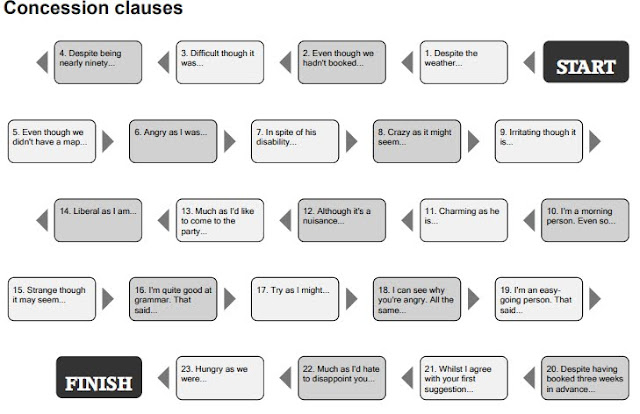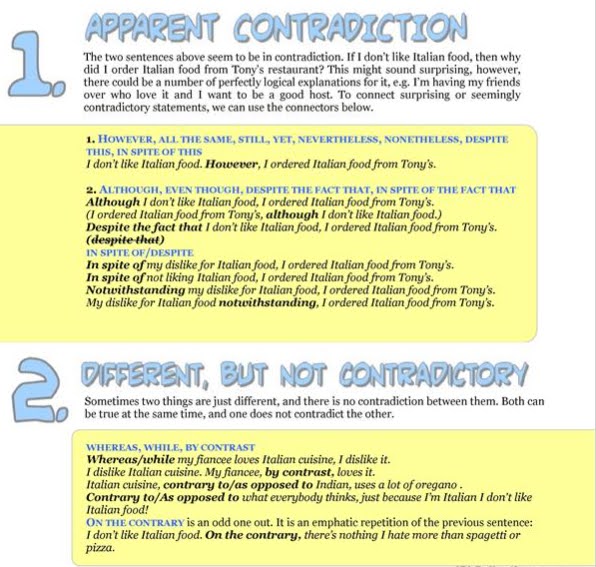Linking devices of contrast
Meaning and use
We can use different words and phrases to highlight a contrast between two parts of a sentence. Some of these words and phrases are:
although, even though, despite, in spite of, however and but.
- Although we are the best of friends we still disagree from time to time.
- Even though we are the best of friends we still disagree from time to time.
- Despite being the best of friends we still disagree from time to time.
- In spite of being the best of friends we still disagree from time to time.
- We are the best of friends; we still disagree from time to time, however.
- We are the best of friends but we still disagree from time to time.
Form
Although / Even though
These conjunctions are used at the beginning of a clause. They introduce a contrast between two ideas, sentences or clauses.
They have similar meanings and are used in the same way. Even though highlights the contrast more strongly than although.
- Even though I did well at the interview I didn’t get the job.
- Although I did well at the interview I didn’t get the job.
- Even though I was really angry I tried not to show it.
- Although I was really angry I tried not to show it.
Despite / in spite of
These are prepositions and are followed by nouns or noun phrases. They can’t be followed directly by a verb phrase. If a verb is used it must be changed to the noun form (gerund).
- Despite doing well at the interview I didn’t get the job.
- In spite of doing well at the interview I didn’t get the job.
- Despite my being really angry I tried not to show it.
- In spite of my being really angry I tried not to show it.
A verb phrase can be used with these expressions by adding the fact after the preposition.
- Despite the fact I did well at the interview I didn’t get the job.
- In spite of the fact I did well at the interview I didn’t get the job.
- Despite the fact I was really angry I tried not to show it.
- In spite of the fact I was really angry I tried not to show it.
However
However is an adverb. It comes after the part of the sentence that is being contrasted. It can go in different parts of the clause.
- I did well at the interview. However, I didn’t get the job.
- I did well at the interview; I didn’t, however, get the job.
- I did well at the interview; I didn’t get the job, however.
- I was really angry; however, I tried not to show it.
- I was really angry; I tried, however, not to show it.
- I was really angry. I tried not to show it, however.
But
This is a conjunction that links two parts of a sentence together. It goes before the clause that has the contrast.
- I did well at the interview but I didn’t get the job.
- I was really angry but I tried not show it.
Take note: Though and although
Though is a shortened form of although. Notice though that although we say even though, we don’t say even although.
Take note: However at the beginning of a sentence
It is not a mistake to use however at the beginning of sentence. However, some people feel that is. If you want to avoid it, use a semi-colon after the first clause rather than a full-stop.
- I did well at the interview; however, I didn’t get the job.
- https://www.englishgrammar.org/spite-grammar-exercise-2/
- https://es.liveworksheets.com/no1188367to
- https://www.perfect-english-grammar.com/linking-words-contrast.html
- https://learnenglish.britishcouncil.org/grammar/intermediate-to-upper-intermediate/in-spite-of-despite-although-even-though-and-though#:~:text=Grammar%20explanation,the%20middle%20of%20the%20sentence.
- https://www.englishexercises.org/makeagame/viewgame.asp?id=7826#a
- Some experts think the world is growing warmer,
but others disagree.
While some experts think
the world is growing warmer, others disagree.
- I don't enjoy rock music, but I went to the
concert anyway.
Although I don’t enjoy rock
music, I went to the concert anyway.
- Whereas prices rose last year, this year they
have gone down.
Prices rose last year; however, this year they have gone down.
- Jim had a headache, but he still read until late.
In spite of his headache,
Jim still read until late.
- Even though they were losing at half-time, City
won in the end.
Despite (being) losing /the
fact that they were losing, City won in the end.
- He wants to work as a disc jockey, whether his
parents like the idea or not.
He wants to work as a disc jockey, even though his parents don’t like the idea.
- Sam lost his job because he was lazy.
Sam was lazy so he lost his
job.
- I couldn't buy the house because it was
expensive.
The house was so expensive
that I couldn’t buy the house.
- The book was so interesting that I couldn't put
it down.
It was such an interesting
book that I couldn’t put it down.
- There was too much noise, so we couldn't hear the
speech.
There was so much noise
that we couldn’t hear the speech.
- The house was too much small to live in
comfortably.
The house wasn't big enough
to live in comfortably.
- The class was cancelled because there weren't
enough students.
There were so few students
that the class was cancelled.
- The mouse ran into its hole to avoid being
trapped by the cat.
The mouse ran into its hole so as not to be trapped by the cat.
- She set the timer to avoid overcooking the beans.
She set the timer in order not
to overcook the beans.
- They used chemicals in order to kill the insects
in the trees.
They used chemicals so as to
kill the insects in the trees.
16.
They made several complaints to the manager to prevent
the same thing from happening again.
They made several complaints to the manager so that the same thing couldn’t happen again.



No comments:
Post a Comment